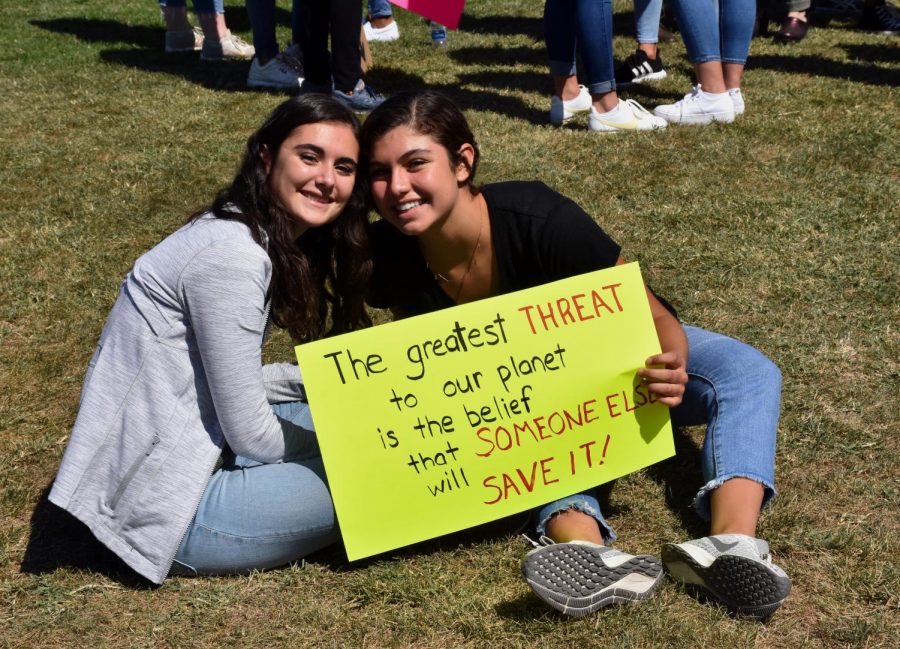WFS Students Strike Against Climate Crisis
October 9, 2019
Everyone knows about the recent action taken by WFS students against the climate crisis, but did you know that similar actions are being taken all over the world right now?
In the 1950s, total production shot up both in the US and all around the world. Along with this upswing in production came the rise of the global temperature. The CO2 output of the world grew increasingly unstable and unsupportable.
Warnings were given. Scientists ran tests and realized that this was a huge problem that might eventually develop into a global crisis. In the 2000s, it became very apparent that this was the case. The melting of the polar ice caps became evident, and our global CO2 emissions were insanely high and rapidly increasing. This, in part, is owed to the extraction of fossil fuels, most prominently coal and oil, from the Earth’s interior. Entire industries and livelihoods are built around these extremely harmful natural materials. Around 94 million barrels of oil are used by the world on a DAILY basis. 1,876,000 tons of coal are used a day, and the US consumes around 14% of that number for the generation of electricity. These numbers continue to rise.
In 2016, the United Nations Framework Convention on Climate Change (UNFCCC) met from November 30th to December 11th in Paris to discuss the climate crisis. Representatives of 196 state parties agreed on the Paris Agreement’s long term goal; to keep the increase in global average temperature to well below 2 °C and to limit the increase to °1.5 C to substantially reduce the risks and effects of climate change. Since then, 195 UNFCCC members have signed the agreement. Under the Paris Agreement, each country must actively take steps towards mitigating global warming.
Multiple countries’ governments have set goals for themselves: France plans to ban all petrol and diesel vehicles in France by 2040 and Norway will ban the sale of them by 2025. Additionally, what has also been happening across the world among the younger population is also astonishing.
Lead by a young 16-year-old schoolgirl named Greta Thunberg, 1.4 million students and youth across 112 countries stepped out in March of 2018 to protest. Their mission: to relay the message of urgency to the ones in power. Since then, Thunberg has given multiple speeches at many UN and EU events across Europe. She is now seen as one of the most impactful climate activists in the world.
Another event organized by Greta Thunberg was a global climate strike that happened on the 20th of September this year. Some WFS students and faculty heard of this and wanted to partake in a similar event. With faculty permission, Fridays For the Future WFS began their campaign. The event was announced and soon the hallways were filled with posters and leaflets. On the Internet, the official Instagram account of FridaysForFutureWFS posted a couple of the leaflets electronically and people started reposting. “It was beautiful to see it all come together,” says organizer and upper school history teacher, Havier Ergueta.
On the 20th of September, 400 WFS students joined the total 4 million strikers that day. There was a teach-in at the nearby Salesianum school which made sure our student body learned something from the experience. Gianna Martinelli ’22 commented, “I think it went extremely well, it really raised awareness in our school community and the communities of other schools. I have been a lot more conscious about what I’m doing and how that impacts the Earth.”
But the event wasn’t just attended by WFS students. Students from nearby schools Tatnall, Ursuline, Charter, Padua, and Salesianum took part in both the march and the teach-in. “I think the climate strike was a very good use of time. It was great to see not only our school get involved, but neighboring schools as well,” says Lyle Knudsen ’21.
A post-climate strike survey was conducted by one of our students and when presented with the question: “When should climate change be addressed?” 97.8% of respondents said “Right now.”
The world is changing. We, the children, are doing more than our part against the climate crisis. Those in power, however, are still not really listening. Until they do, we must be the ones to act. It is up to us to change their minds. How can students do this, you may be asking? Well, a great way to start is by signing up for the school club, Fridays For the Future WFS!































